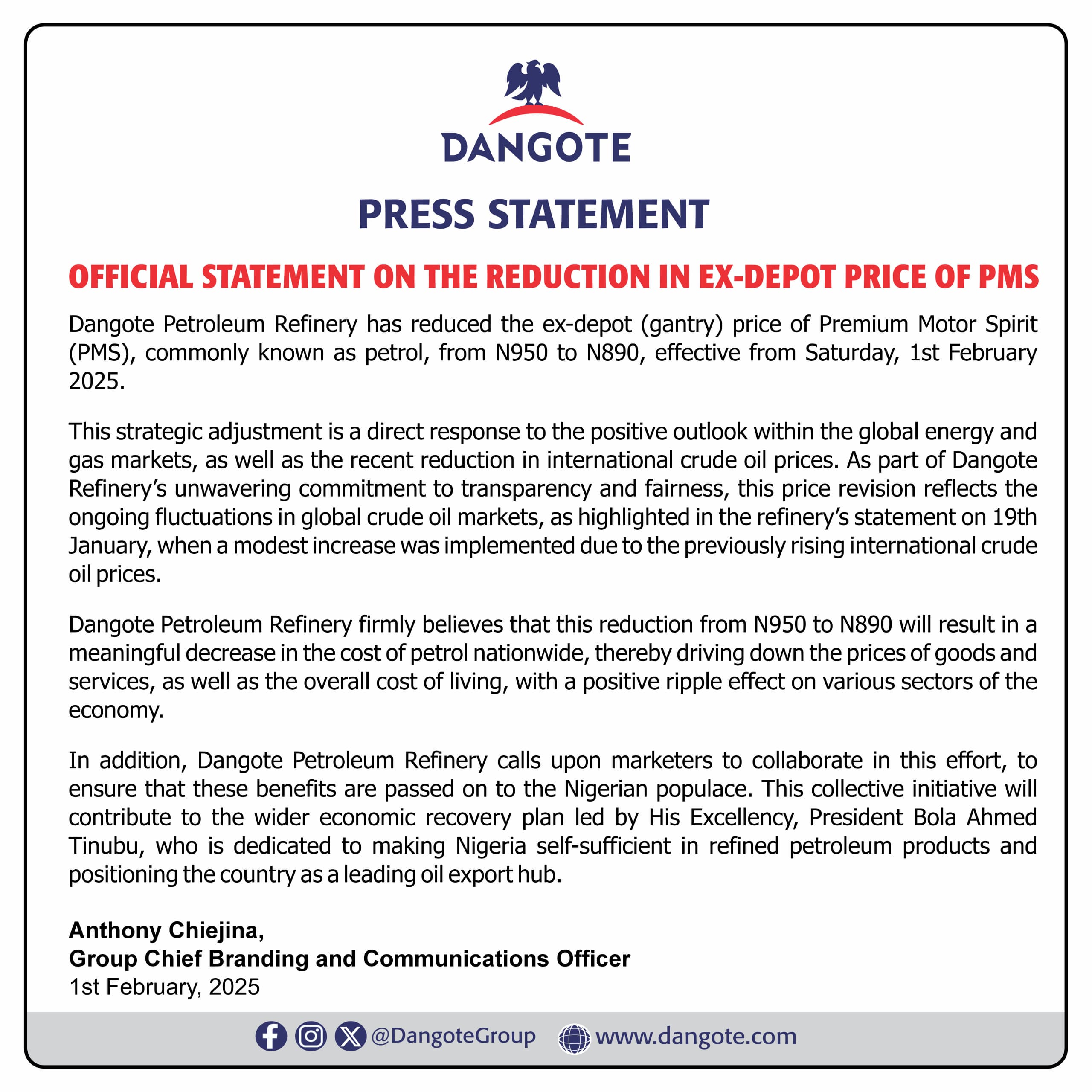Nigeria’s economic landscape received a significant boost as Dangote Petroleum Refinery announced a substantial reduction in petrol prices, dropping the ex-depot rate from N950 to N890 per litre effective immediately. This strategic price adjustment reflects recent positive shifts in global energy markets and marks a potentially transformative moment for Nigerian consumers.
The announcement, delivered through Group Chief Branding and Communications Officer Anthony Chiejina, comes as welcome news to millions of Nigerians grappling with high living costs. The price reduction follows careful monitoring of international crude oil price trends, demonstrating the refinery’s commitment to responsive pricing strategies that benefit consumers.
This latest move represents a reversal from the company’s January 19th price increase, which was necessitated by rising crude oil costs at the time. The current downward adjustment showcases Dangote Refinery’s ability to quickly adapt to favorable market conditions, potentially setting a new standard for pricing dynamics in Nigeria’s petroleum sector.
The refinery’s decision carries broader implications for Nigeria’s economy, as transportation costs significantly influence prices across all sectors. By reducing fuel costs, the company aims to trigger a positive ripple effect that could lead to decreased prices for goods and services throughout the economy, potentially easing the financial burden on Nigerian households.
Market analysts note that this price reduction could mark a turning point in Nigeria’s fuel pricing history, as it demonstrates the potential benefits of domestic refining capacity. The move aligns with President Bola Tinubu’s vision of achieving self-sufficiency in refined petroleum products while positioning Nigeria as a prominent player in the global oil export market.
Dangote Refinery has also issued a clear call to action for marketers nationwide, urging them to ensure these price reductions reach end consumers. This emphasis on proper implementation highlights the company’s commitment to ensuring that the benefits of lower fuel prices translate into real savings for ordinary Nigerians.
The timing of this announcement is particularly significant as it coincides with ongoing efforts to stabilize Nigeria’s economy and manage inflation. The reduction in fuel prices could provide much-needed relief to businesses and households still adjusting to recent economic reforms and policy changes.
Industry experts suggest that this price reduction could potentially reshape competition within Nigeria’s petroleum sector. As the country’s largest private refinery takes the lead in reducing prices, other players in the market may feel pressure to adjust their pricing strategies accordingly, potentially leading to more competitive fuel prices across the board.
The company’s emphasis on aligning with market realities while ensuring consumer benefits demonstrates a balanced approach to pricing strategy. This approach could serve as a model for other industries grappling with the challenge of maintaining profitability while considering consumer welfare.
The price reduction also represents a significant step toward President Tinubu’s economic revival plans, particularly in the petroleum sector. By demonstrating the capacity to respond to global market trends and adjust prices accordingly, Dangote Refinery is helping to establish Nigeria as a more self-reliant nation in terms of fuel supply and pricing.
Looking ahead, the impact of this price reduction will likely extend beyond immediate consumer savings. The potential for reduced transportation costs could lead to improved business operations across various sectors, potentially stimulating economic growth and job creation.
As Nigeria continues its journey toward economic transformation, moves like this by major players in the petroleum sector suggest a promising future for the country’s energy landscape. The ability to adjust prices based on market conditions while maintaining operational efficiency marks a significant milestone in Nigeria’s quest for energy independence and economic stability.




